Tag Archives: Bonnet Carre spillway
More than $30 million & 300 jobs lost during 2019 spillway opening, MSU study finds
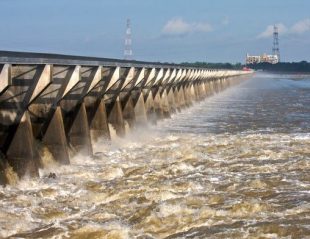 The 2019 opening of the Bonnet Carré Spillway cost the Mississippi Coast hundreds of jobs and millions of dollars, a scenario likely to repeat itself and endanger a seafood industry that has been vital to the economy and culture, a study from Mississippi State University concludes. The seafood industry also has declined because of competition from imports, the study noted. Interviews showed many fishermen, including those who specialize in shrimp and oysters, are selling their boats and leaving an industry that supported their families for generations. Video, more, >>CLICK TO READ<< 15:14
The 2019 opening of the Bonnet Carré Spillway cost the Mississippi Coast hundreds of jobs and millions of dollars, a scenario likely to repeat itself and endanger a seafood industry that has been vital to the economy and culture, a study from Mississippi State University concludes. The seafood industry also has declined because of competition from imports, the study noted. Interviews showed many fishermen, including those who specialize in shrimp and oysters, are selling their boats and leaving an industry that supported their families for generations. Video, more, >>CLICK TO READ<< 15:14
Will $2.9 million in grants actually help Mississippi fishermen?
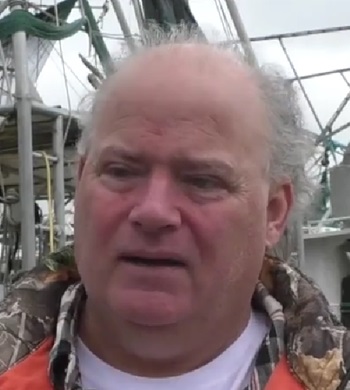 In 2023, it was declared that it was a federal fisheries disaster, making Mississippi fisheries eligible for assistance. “At this point, it’s more like a feel-good program,” said one fisherman. “Here, let me give you a little money, make you feel better.” It’s been five years since disaster struck the fishing industry in the gulf, and while fishermen have received some help since then, they say the response has been slow – too slow to actually be beneficial. Mark Kopszywa has found himself in a perpetual cycle of playing catch-up after taking such a big loss in 2019 and not being able to make up for it quickly. Video, more, >>click to read<< 06:29
In 2023, it was declared that it was a federal fisheries disaster, making Mississippi fisheries eligible for assistance. “At this point, it’s more like a feel-good program,” said one fisherman. “Here, let me give you a little money, make you feel better.” It’s been five years since disaster struck the fishing industry in the gulf, and while fishermen have received some help since then, they say the response has been slow – too slow to actually be beneficial. Mark Kopszywa has found himself in a perpetual cycle of playing catch-up after taking such a big loss in 2019 and not being able to make up for it quickly. Video, more, >>click to read<< 06:29
Senator Wicker Statement on the $2.9 Million Awarded to Mississippi Fisheries for 2019 Bonnet Carré Spillway Openings
 U.S. Senator Roger Wicker, R-Miss., released the following statement after the U.S. Department of Commerce (DOC) awarded $2,993,283 in federal disaster relief funds to Mississippi’s shrimp and oyster fisheries. The funding is available because DOC declared a “commercial fishery failure” in 2020 after the repeated openings of the Bonnet Carré Spillway in 2019. The state will distribute the funds to fishermen, aquaculture businesses, and seafood processors to help cover some of their losses. “This funding is helpful, but it does not make the impacted businesses whole. It should not take years for disaster funds to trickle in. more, >>click to read<< 13:39
U.S. Senator Roger Wicker, R-Miss., released the following statement after the U.S. Department of Commerce (DOC) awarded $2,993,283 in federal disaster relief funds to Mississippi’s shrimp and oyster fisheries. The funding is available because DOC declared a “commercial fishery failure” in 2020 after the repeated openings of the Bonnet Carré Spillway in 2019. The state will distribute the funds to fishermen, aquaculture businesses, and seafood processors to help cover some of their losses. “This funding is helpful, but it does not make the impacted businesses whole. It should not take years for disaster funds to trickle in. more, >>click to read<< 13:39
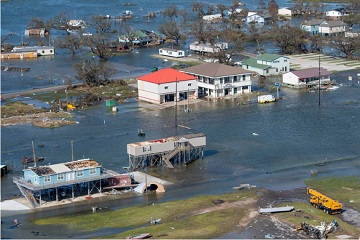
Federal Fisheries disaster declared for Louisiana over 2020 hurricanes – Mississippi also sees disaster declaration
The federal government has announced its approval of a disaster declaration over damage to Louisiana fisheries due to three 2020 hurricanes, opening the door to federal aid for commercial fishers. Separately, Mississippi fisheries were issued another disaster declaration over the unprecedented 2019 Bonnet Carre Spillway openings in Louisiana. The governor noted the affected parishes were home to nearly 2,500 commercial fishers and vessels combined along with more than 100 wholesale dealers and a similar number of charter captains. The storm led to damaged docks and boating facilities, lost gear and vessels, lost housing and loss of stored seafood, Edwards said. >click to read< 13:14
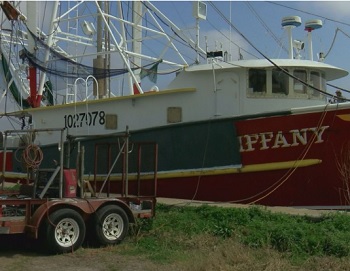
Mississippi Commission on Marine Resources talk Bonnet Carré Spillway, CARES Act funding
Many fishermen got some help from that $1.5 million of CARES Act money that was granted to the state of Mississippi, with most of that going to the seafood industry. $734,222 of that money went to local commercial fishermen, $451,284 went to seafood dealers and processors, and $239,179 of it went to the charter boat fleet.,, At Tuesday’s Commission on Marine Resources meeting, Joe Spraggins, Department of Marine Resources executive director, explained the process of how $21 million in Bonnet Carré Spillway relief funding will get to those in the industry. >click to read< 18:25
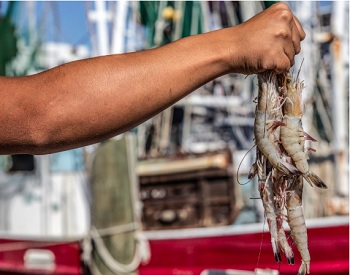
Mississippi’s Coast shrimpers cling to legacy through the industry’s choppy waters
Danny Ross, an Ocean Springs shrimper, has been on a boat for as long as he could walk. He remembers driving the family vessel as a kid, having to climb onto the dashboard to see over the steering wheel. “Two spokes to the left,” his dad would direct. He remembers, back on land, getting bad grades in art class because he would only draw one thing. “I’d draw a pretty good boat too,” he said. “Me and my brothers were always on the boat. The rigging, the pipes – that was our jungle gym. And our swimming pool? The boat would be shrimping and we’d be diving off the bow, catching ropes on the outrivers.” Ross, 55, recently tied up his boat after a disappointing season that saw fresh water kill 56 percent of Mississippi’s shrimp. The plummeting price of shrimp has made it difficult for Ross to find crew members, and instead he’s gone to work on another captain’s boat. After following five generations of fishermen into the business, he’s worried about the direction the industry is headed in. photos, >click to read<. This is a two part series, >click to read Part 1< , with photo gallery 08:09

Graves requests $100M in fisheries disaster assistance to La. after record-setting opening of Bonnet Carre Spillway
Congressman Garret Graves has written a letter to the National Oceanic an Atmospheric Administration (NOAA) asking them to allocated the remaining $100 million in fisheries disaster assistance to Louisiana to go towards mitigating the impacts of the recent openings of the Bonnet Carre Spillway.,, “To rub even more salt in the wound, our fishing industry has been taking it on the chin for years, punished by previous, man-made disadvantages, including falsely labeled crawfish from overseas and imported shrimp taking precedent in the market over our domestic and sustainable seafood products,” said Graves. >click to read< 12:50

Coast leaders file federal lawsuit to change procedures for future spillway openings
In the spring and summer of 2019, the U.S. Army Corps of Engineers and the Mississippi River Commission opened the Bonnet Carré spillway element of the Mississippi River and Tributaries Project, releasing copious amounts of freshwater through the Lake Pontchartrain Basin and into the Mississippi Sound, wreaking havoc on the natural resources, communities and businesses on the Mississippi Gulf Coast.,,, “The members of Mississippi Commercial Fisheries United want to be recorded in history as having fought to defend the environment and marine life in our Mississippi Sound,” said Ryan Radley, a fifth-generation fisherman and executive director of Mississippi Coast Fisheries United. >click to read< 07:46

Gulf Coast leaders form coalition to protect Mississippi Sound after devastating spillway openings
The marine life in the Mississippi Sound endured a tumultuous spring and summer this year due to freshwater from the Mississippi River flowing in at an unprecedented rate. Freshwater entered the Sound through the Bonnet Carré Spillway, a structure in Louisiana that releases water from the Mississippi River to prevent flooding in New Orleans. Never before had the spillway been opened in consecutive years, nor twice in one year; the U.S. Army Corps of Engineers, which operates the gates, broke both those records this year after a historic wet season across the river’s basin. >click to read< 11:38

Mississippi to sue Army Corps of Engineers over extended opening of spillway
Mississippi’s attorney general said Thursday that he will sue the U.S. Army Corps of Engineers for environmental and economic damage the state experienced after the Corps opened a spillway for two extended periods this year to protect New Orleans from flooding.,, Hood said he does not want New Orleans to flood but the Corps should better assess potential damage to Mississippi when deciding whether to open the Bonnet Carre spillway. He said if the federal government decides to open the spillway often, “they’ll have to pay for it because it’s just about put our seafood industry out of business.” >click to read< 17:11
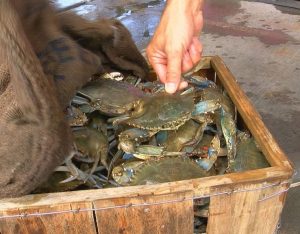
Federal fisheries declaration approved for Mississippi
Congressional leaders announced a federal fisheries disaster declaration Wednesday morning to help South Mississippi fishermen affected by the opening of the Bonnet Carre Spillway. Mississippi leaders said in a statement that they are now working to expedite the funds set aside by the disaster declaration to provide fishermen with disaster relief more quickly. >click to read< 12:03
Wicker, Hyde-Smith, & Palazzo Commend Federal Fishery Disaster Declaration for Mississippi – >click to read<
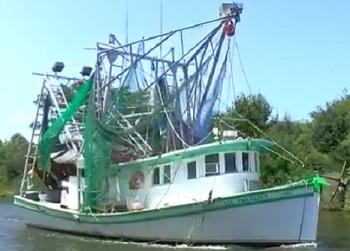
Louisiana Dept. of Wildlife and Fisheries: report of loss linked to Bonnet Carre Spillway opening
“This is the worst I’ve ever seen it in my life,” Shrimper Charles Robin said. Robin is a shrimper in Yscloskey. He said his catch dropped by more than half this year compared to last. “Last year on average I’d catch a thousand or 1,200 pounds a day on a slow day. Now, you can’t even catch 500 pounds,” Robin said. According to Wildlife and Fisheries, brown shrimp landings are down 34 to 44 percent compared to the five year average. St. Bernard Parish President Guy McInnis said he’s actively pushing for an Emergency Fisheries Declaration in Washington, D.C. Video, >click to read<16:33
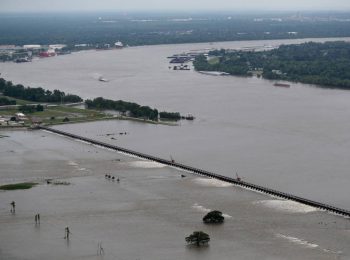
Bonnet Carre Spillway shut down as river falls below flood stage
The U.S. Army Corps of Engineers over the weekend completed the shutdown of the Bonnet Carre Spillway north of New Orleans, starting a process that will lead to the return of normal saltwater conditions in the Mississippi Sound. The return to normalcy in the Sound will take a minimum of two to four weeks,,, Recovery of aspects of the seafood industry is going to take years to recover, Graham said, citing the oysters, whose beds have been virtually destroyed by the fresh water.,, He said the shrimp industry, which, according to the Department of Marine Resources, over the past five years have yielded 2 million pounds in June, compared with about 500,000 pounds this June, should recover much quicker. >click to read< 08:25
2019 shrimp season is worst Pass Christian seafood dealer has seen in more than 40 years
Jeremy Forte’s family seafood business has never seen a shrimp season as bad as this year. Not only are they seeing the affects of the Bonnet Carré on the ecosystem, but the algae warnings for seafood has been detrimental to their business. Video, >click to watch< 14:18
New bill would pay Coast fisherman for losses after Bonnet Carré opening, algae bloom – >click to read<
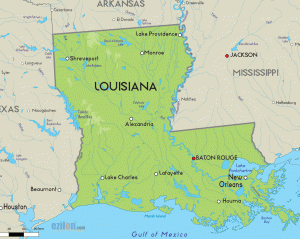
Louisiana lawmakers request disaster aid for seafood industry
U.S. Senators Bill Cassidy, M.D. and John Kennedy and U.S. Representatives Steve Scalise , Garret Graves, Cedric Richmond, Clay Higgins, Ralph Abraham and Mike Johnson today urged Commerce Secretary Wilbur Ross to begin the process of implementing a federal fisheries disaster declaration due to the opening of the Bonnet Carré Spillway. Opening of the spillway is causing hundreds of thousands of cubic feet of fresh water to pour into Lake Pontchartrain each second, impacting various forms of aquatic life that are crucial to Louisiana’s seafood industry. >click to read< 07:42 >Click to read< the full text of the Louisiana delegation’s
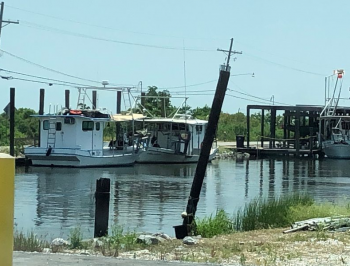
Oystermen say closures of prime harvest areas was inevitable
St. Bernard fishermen say the state health department made the right call this week with the closure of three main harvest areas. As they struggle to make ends meet they say it’s important to move quickly to save what’s left. Oyster boats that should have been out were instead tied to a Hopedale dock that would normally be bustling Friday (July 5). Two days earlier, the state announced a closure of three oyster zones, which longtime oyster fisherman Van Robin said shut down one of the most productive regions in the world. “The most highly productive areas, they’re closing it, because the oysters are dying in that area. >click to read< 00:02
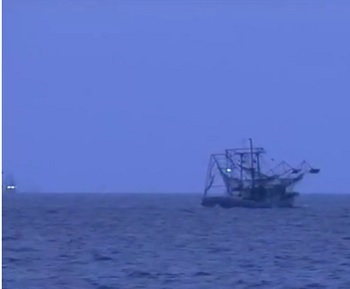
Water conditions causing ‘catastrophic’ season for in-shore and near-shore shrimpers
The Bonnet Carre Spillway has been open for 100 days as of Friday and the influx of freshwater still pouring into the Mississippi Sound is taking a major toll on coast fishermen. The shrimp season opened two weeks ago but, by most accounts, the freshwater in the Mississippi Sound is making it a season to forget for those who make their living on the water. Shrimpers are having to adjust where they drop their nets, said David Veal director of American Shrimp Processors Association. Video, >click to read< 14:56
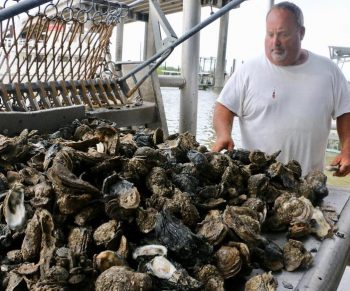
Katrina, BP, 2019 Mississippi River — Oyster Industry Braces For Another Major Disaster
The commercial fishing industry on the Gulf Coast has seen two major disasters in the last 15 years: Hurricane Katrina and the BP oil spill. Now, some fear we’re on the cusp of a third. The culprit: historic flooding from the Mississippi River. Commercial oysterman Mitch Jurisich is picking through a pile of freshly harvested oysters at a dock in Empire, Louisiana. One hand clutches an oyster knife, the other grabs a bivalve from the top of the mound. “This one’s good right here,” he says before tossing it aside and picking up another. “This one’s not good.” Audio, >click to read< 20:28
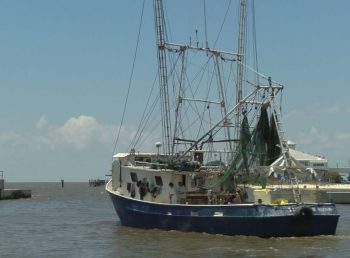
Mississippi’s shrimp season will open Thursday. It doesn’t look good.
Mississippi’s shrimp season will open this Thursday, June 20 at 6am, despite samples showing smaller shrimp than typical for opening day. That’s the decision from Tuesday’s Commission on Marine Resources meeting. It’s not a cause for celebration though. It’s more of a sign of desperation. Usually, the legal count for shrimp must be 68 shrimp per pound before the season is opened. Right now, samples are showing 112,,, Experts also report that brown shrimp reproduction is down 90%. “I don’t think it really matters. I think the situation now is only getting worse, so why don’t we take the best we can? The only chance we have now is to allow our shrimpers to have some chance to have a life this year,” said Joe Spraggins, the director of the Department of Marine Resources. >click to read<19:36

Updated – Letter: Gulf Seafood industry hampered by spillway opening
Gulf seafood harvesters need federal disaster recovery funding to ease the suffering caused by the opening of the Bonnet Carre Spillway.,, In a letter to the U.S. secretary of commerce, Mississippi Gov. Phil Bryant stated that 70% of the Mississippi Sound’s already imperiled oyster population is estimated to be dead, with the crab catch down by 35%. Shrimp season in Mississippi, which usually begins in June, will also be affected. >click to read<14:36
Gov. Edwards Requests Federal Disaster Declaration for Flooded Fisheries – >click to read<

The power to open Bonnet Carré spillway rests 200 miles from ‘struggling’ Gulf Coast
The U.S. Army Corps of Engineers opens the Bonnet Carré to prevent Mississippi River flooding in New Orleans, but Coast residents on less populated shores of South Mississippi and Louisiana feel the fallout. The fresh, polluted water floods Lake Pontchartrain and the Mississippi Sound. For the first time in history, the spillway has opened two years in a row — 2018 and 2019 — and two times in one year — 2019. Dolphins and oysters are dying. Shrimp are disappearing. Fish are covered in lesions. And the oxygen-starved Dead Zone, documented annually in the Gulf of Mexico, is expected this summer to be the size of Massachusetts, which is close to the 2017 record, the National Oceanic and Atmospheric Administration says. Video, photo’s >click to read<10:23
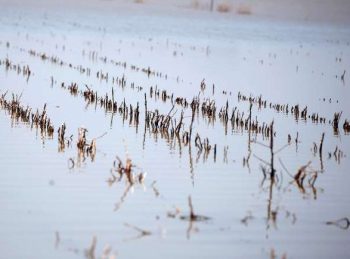
‘A major punch in the gut’: Midwest rains projected to create Gulf dead zone
As rain deluged the Midwest this spring, commercial fisherman Ryan Bradley knew it was only a matter of time before the disaster reached him. All that water falling on all that fertilizer-enriched farmland would soon wend its way through streams and rivers into Bradley’s fishing grounds in the Gulf of Mexico, off the Mississippi coast. The nutrient excess would cause tiny algae to burst into bloom, then die, sink, and decompose on the ocean floor. That process would suck all the oxygen from the water, turning it toxic. Fish would suffocate, or flee, leaving Bradley and his fellow fishermen with nothing to harvest. >click to read<21:12
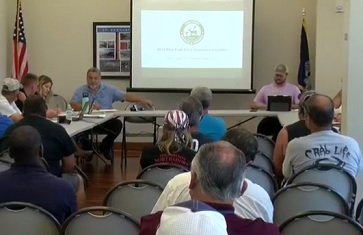
La. crabbers, fishers ask for federal aid amid spillway openings
The Louisiana Crab Task Force met Tuesday (June 4) in Chalmette to discuss the issues facing the commercial crabbing industry as a result of the spillway openings. The group motioned to work with other seafood industry task forces to write a joint letter requesting federal help. Dozens of fishermen attended the meeting, voicing their concerns about how the opening of the Bonnet Carre Spillway is affecting their livelihoods. A spokesperson with the Louisiana Department of Wildlife and Fisheries said they have been monitoring the water quality and reports of fish kills. >click to read<21:43
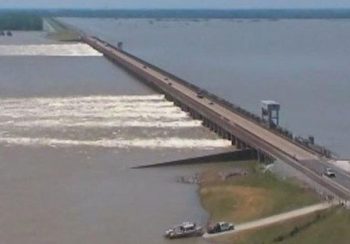
Morganza opening may drown the livelihoods of thousands of Gulf fishermen
Louisiana Lt. Governor Billy Nungesser is supporting a Gulf-wide coalition that wants FEMA to declare a state of emergency specific to Gulf seafood and its related industries. This comes as U.S. Army Corps of Engineers prepares to open the Morganza Spillway, sending fresh water into a fragile ecosystem that is home to a wide variety of Gulf seafood.,,, “The opening of the Morganza Spillway will cause severe damage to the Atchafalaya Basin, our nation’s largest estuary,” said Nungesser. “The opening of the Bonnet Carre Spillway earlier this year already has negatively impacted seafood in lakes Pontchartrain and Borgne, as well as fisheries in Mississippi. >click to read<18:31
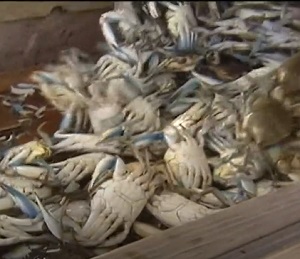
‘I’m out of work:’ Open Bonnet Carre Spillway hurts local fisherman
The Bonnet Carre Spillway is currently open to keep the Mississippi River from overflowing and damaging the levee system. But crab fisherman say there’s another side to the water diversion: The longer it stays open, the more damage it will do to the fishing industry. Fisherman along Lake St. Catherine say this time of the year their traps are usually brimming with crabs, but Saturday when Eyewitness News came to look, most of the traps had been pulled out of the water. >Video, click to read<15:16
Lake Pontchartrain is crawling with crabs again, and it has the January opening of the Bonnet Carre Spillway to thank
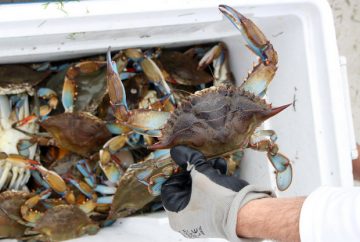 Gary Bauer, owner of Pontchartrain Blue Crab in Slidell, said crab production was abysmal in Lake Pontchartrain for three straight years, but it’s rebounded in 2016. “When I fished for a living, when the spillway was open, you knew you were going to have crabs for the next year or two,” he said. “The old-timers consider that fresh layer of silt to be like fertilizer.” A New Orleans East native, Bauer crabbed from 1979 through 1994, and opened his factory in 1999. He said both the quality and quantity of crabs have been better this year. “Lake Pontchartrain and Lake Borgne have been way off, and this year it’s been an improvement,” Bauer said. “We’re not out of the woods yet, but there is definitely an improvement.” Bauer said some fishers pull right up to his dock to sell their catch, but he also buys crabs from wholesalers based around the coast. “A lot of people who used to fish here have moved on to greener pastures, where the crab production has been better,” he said. “The first five years we were in business, we had only one truck. Now we have four. That tells you where the crabs have been coming from.” Read the story here 14:06
Gary Bauer, owner of Pontchartrain Blue Crab in Slidell, said crab production was abysmal in Lake Pontchartrain for three straight years, but it’s rebounded in 2016. “When I fished for a living, when the spillway was open, you knew you were going to have crabs for the next year or two,” he said. “The old-timers consider that fresh layer of silt to be like fertilizer.” A New Orleans East native, Bauer crabbed from 1979 through 1994, and opened his factory in 1999. He said both the quality and quantity of crabs have been better this year. “Lake Pontchartrain and Lake Borgne have been way off, and this year it’s been an improvement,” Bauer said. “We’re not out of the woods yet, but there is definitely an improvement.” Bauer said some fishers pull right up to his dock to sell their catch, but he also buys crabs from wholesalers based around the coast. “A lot of people who used to fish here have moved on to greener pastures, where the crab production has been better,” he said. “The first five years we were in business, we had only one truck. Now we have four. That tells you where the crabs have been coming from.” Read the story here 14:06
Fishermen hope to rescue oysters, as well as their livelihood
 Coast fishermen are preparing to make much-needed money in the face of disaster. Beginning at sunrise Monday, fisherman will begin to move oysters to safety away from surging fresh water into the Mississippi Sound. But, it won’t be easy, and the money likely won’t be enough to make up for a disastrous six-year struggle.The Oyster Recovery Program is allowing fishermen to move oysters from the St. Joe’s Reef south of Waveland out of harm’s way. Fresh water from the recently opened Bonnet Carre spillway is threatening their habitat. Video, Read the article here 09:34
Coast fishermen are preparing to make much-needed money in the face of disaster. Beginning at sunrise Monday, fisherman will begin to move oysters to safety away from surging fresh water into the Mississippi Sound. But, it won’t be easy, and the money likely won’t be enough to make up for a disastrous six-year struggle.The Oyster Recovery Program is allowing fishermen to move oysters from the St. Joe’s Reef south of Waveland out of harm’s way. Fresh water from the recently opened Bonnet Carre spillway is threatening their habitat. Video, Read the article here 09:34






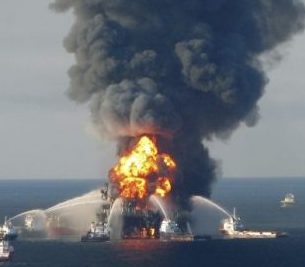
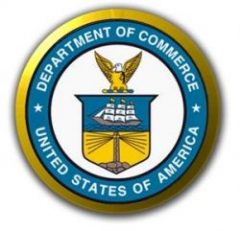




























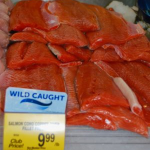
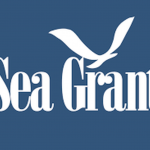



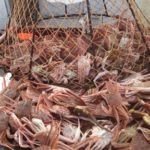

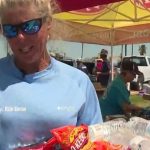




Mississippi DMR hearing public comments on spillway relief funding
The 2019 openings of the Bonnet Carre Spillway are still being felt here on the Gulf Coast a year later. NOAA has allocated about $88 million in relief funding due to the spillway impacts, and a little more than $21 million is coming to Mississippi. “Everything from the fin fish, to the crab, to the oysters, to the shrimp. Any type fish in the Gulf, it covers that,” said Joe Spraggins, “We’re not going to have that without our commercial fishermen. We’ve got to have them,” said Spraggins. “It’s a matter of whether you stay in business or not, and if these companies leave, if they ever leave us, we’ll never get them back, If these oyster fishermen shrimpers, crab fishermen, we’ll never get them back.” Video, >click to read< 08:56
Share this post